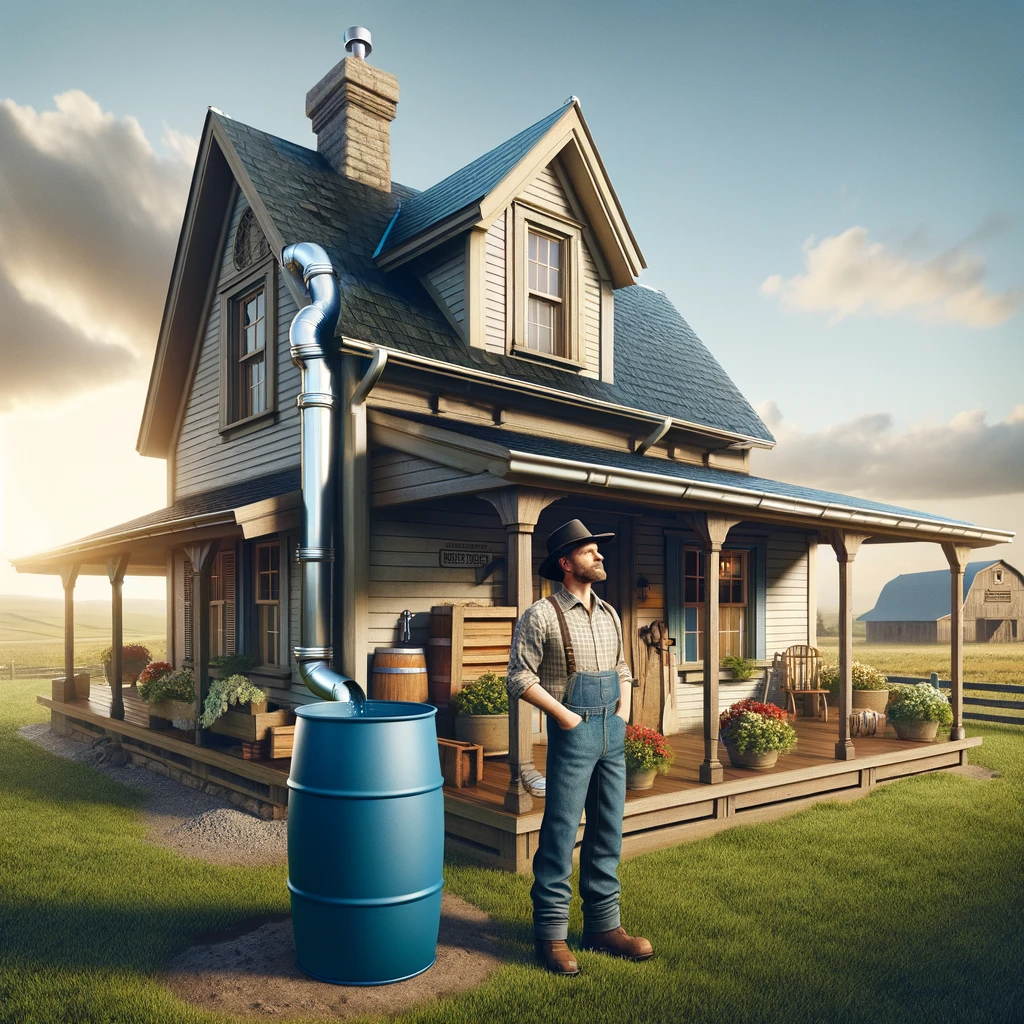Here's the short of it: Rainwater collection is legal.
IT IS LEGAL TO COLLECT RAINWATER IN THE UNITED STATES OF AMERICA
It is legal at the state level AND the Federal level. However, some states have specific restrictions/criterial. More detailed below. But if you don't read any more of this, just know that ANYONE telling you that it is illegal is wrong. Send them this link.

FULL POST
We had heard from more and more people that they wanted to collect rain water for use on their property, crops, and hobbies, but they were afraid of getting in trouble because it is illegal!!!
Hearing this really surprised me. Being pretty skeptical of stuff like this I started to do some homework and, I was pretty happy to see that it really isn't hard to find the answer to this. We had just been accepting everyone else's thoughts on the issue instead of actually challenging what we were told. I encourage you to challenge what you are told by other people, see in the media, read on social media, and otherwise are fed for your mental consumption. The answers are there, we just get busy and sometimes even lazy (I am absolutely a culprit of that...)
Rainwater collection, often perceived as a gray area or even illegal by some, is a sustainable practice that has seen a resurgence in popularity due to its environmental benefits and practical applications. Contrary to common misconceptions, rainwater harvesting is legal in many parts of the world, albeit with some regulations to ensure it does not affect the natural water cycle or infringe upon water rights.
You don't want to take away water that someone else might desperately need and definitely don't want to be denying the environment water that it has always sustained itself on. However, often times, rain water ends up being WAY more than the land and other people need, and it just runs off into drains or pools into brackish bogs of death and doom. Want some mosquitos with that?
The myth surrounding the illegality of rainwater harvesting stems from isolated cases and misunderstandings of water rights laws, particularly in the Western United States. These laws were established to regulate the use of natural water resources, including rivers, streams, and groundwater, but they do not necessarily make it illegal to collect rainwater.
In those cases, we aren't talking about your podunk local farmer, homesteader, backyard gardener. These companies are taking tens of millions of gallons of water a year. Can you imagine that? I can't.
- An Olympic swimming pool is ~660,430 gallons.
- 2,000,000 gallons is what Nestle was allowed to take.
- 58,000,000 gallons is what Nestle was taking.
- 660,430 gallons for an olympic swimming pool
- That's 88 olympic swimming pools.
Now, I still can't imagine that, so let's try something more familiar.
In terms of "yards" (cubic yards) of soil/rock/clay/etc delivered to you:
- That's 287,166 yards.
- 11,600,000 5-gallon Home Depot Buckets.
Ok, enough silly metrics.
Look at it this way, the average American household uses ~300 gallons of water a day. That's 109,500 gallons per year. Nestle's 58,000,000 gallons per year covers over 500 households just at this average rate. But we Californian's are special, we only use ~85 gallons per day, equalling 31,025 gallons per household per year. Nestle's water use could cover almost 2000 households in California.
That's a long way to say that these laws protecting water collection are to protect WE THE PEOPLE, not to prevent us from collecting water.
Alright, I get it, rainwater collection is ok and legal but there are laws to prevent big companies from abusing this system. So, where is it ok and are all of the laws the same?
Boy am I glad you asked that!
Here's the important part, and I'll make it into a simple spreadsheet for ya.
| State | Is it Legal? | Restrictions? | INCENTIVES |
| Alabama | YES | NO | |
| Alaska | YES | NO | |
| Arizona | YES | NO | YES |
| Arkansas | YES | SOME | |
| California | YES | SOME | |
| Colorado | YES | SOME | |
| Connecticut | YES | NO | |
| Delaware | YES | NO | |
| Florida | YES | NO | YES |
| Georgia | YES | SOME | |
| Hawaii | YES | NO | YES |
| Idaho | YES | NO | |
| Illinois | YES | SOME | |
| Indiana | YES | NO | |
| Iowa | YES | NO | |
| Kansas | YES | PERMIT MAY BE REQUIRED | |
| Kentucky[B] | YES | NO | |
| Louisiana | YES | NO | |
| Maine | YES | NO | |
| Maryland | YES | NO | YES |
| Massachusetts[B] | YES | NO | |
| Michigan | YES | NO | YES |
| Minnesota | YES | NO | YES |
| Mississippi | YES | NO | |
| Missouri | YES | NO | |
| Montana | YES | NO | |
| Nebraska | YES | NO | |
| Nevada | YES | SOME | |
| New Hampshire | YES | NO | |
| New Jersey | YES | NO | YES |
| New Mexico | YES | NO | YES |
| New York | YES | NO | |
| North Carolina | YES | SOME | YES |
| North Dakota | YES | PERMIT MAY BE REQUIRED | |
| Ohio | YES | SOME | |
| Oklahoma | YES | NO | |
| Oregon | YES | SOME | YES |
| Pennsylvania[B] | YES | NO | YES |
| Rhode Island | YES | SOME | YES |
| South Carolina | YES | NO | |
| South Dakota | YES | NO | |
| Tennessee | YES | NO | |
| Texas | YES | SOME | YES |
| Utah | YES | SOME | |
| Vermont | YES | NO | |
| Virginia[B] | YES | SOME | |
| Washington | YES | SOME | |
| West Virginia | YES | NO | |
| Wisconsin | YES | SOME | |
| Wyoming | YES | NO | YES |
The last bit that I want to leave you with is this. DON'T JUST TRUST MY WORD ON IT. I'll give credible sources below. Please go and look up your specific area.
Oh, and if I'm disappeared sometime in the not so distant future, it isn't the gov that got me, it's likely a certain company that got slapped with tons of fines for taking YOUR fresh drinking water. They tend to not like it when people like me come along and point out the truth. 😉
Until next time!
Sources for your own homework:

